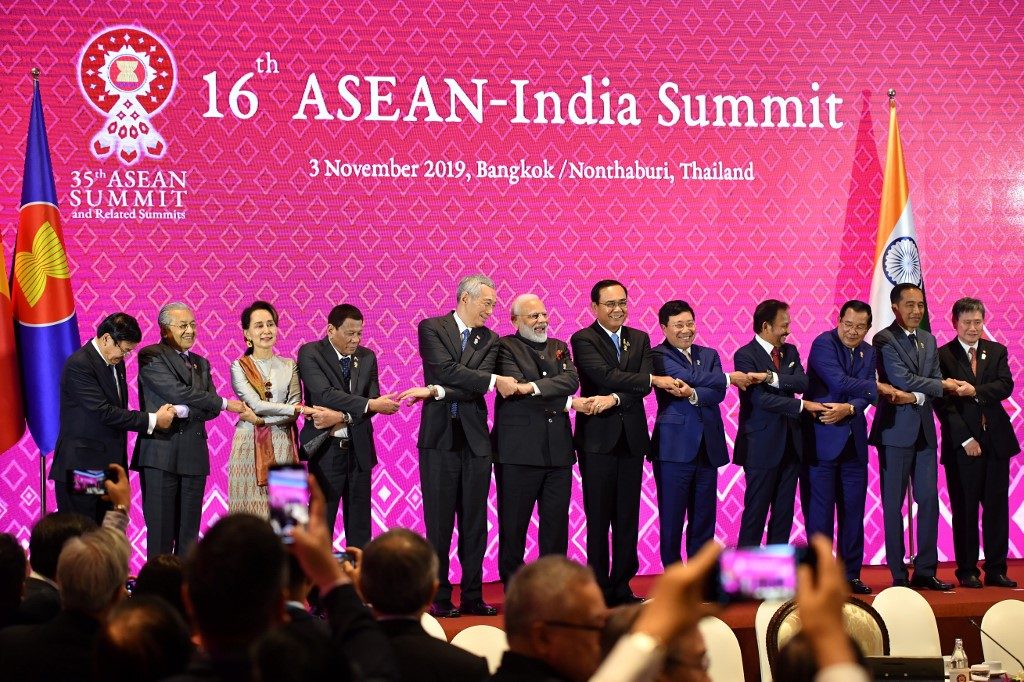SUMMARY
This is AI generated summarization, which may have errors. For context, always refer to the full article.

BANGKOK, Thailand (UPDATED) – The signing of the world’s largest trade pact will likely be kicked back to 2020, according to a draft statement by Southeast Asian leaders, delaying a deal craved by China as it seeks to temper the fallout from a painful tariff war with the US.
The 16-nation Regional Comprehensive Economic Partnership (RCEP) spans from India to New Zealand and includes 30% of global GDP and half of the world’s people.
Objections by India have dampened hopes of finalising the pact at this weekend’s Association of Southeast Asian Nations (ASEAN) summit in Bangkok, where members of the 10-nation bloc have been joined by the premiers of India and China.
“Most market access negotiations have been completed and the few outstanding bilateral issues will be resolved by Feb 2020,” said a draft agreement obtained by Agence France-Presse.
Negotiations have sputtered for several years, but the statement said the text of all 20 chapters was now complete “pending the resolution of one” member, believed to be India.
But it said all members were “committed to sign the RCEP” next year in Vietnam, which will take over the ASEAN chair.
New Delhi is worried its small businesses will be hard hit by any flood of cheap Chinese goods.
Indian Prime Minister Narendra Modi repeated his country’s concerns during talks with ASEAN leaders on Sunday.
Modi said India’s unresolved issues include “meaningful market access for all parties”, according to a diplomat who attended the meeting, speaking to Agence France-Presse on condition of anonymity.
Beijing sees RCEP as a central pillar of its trade strategy for its Asian neighborhood, and it is backed by the leaders of ASEAN and who represent a 650 million-strong market. (READ: [ANALYSIS] ASEAN likes, but also fears, China’s economic weight)
Concluding the deal has been made more pressing by the brutal tit-for-tat trade war with the US, which has chipped back at growth in China, the world’s second-largest economy. (READ: Asian countries denounce ‘real threat’ of global trade war)
Sea tensions
RCEP – which includes the 10-nation ASEAN bloc along with China, India, Japan, South Korea, Australia and New Zealand – accounts for 40% of global commerce.
The tariffs lobbed by the US and China on billions of dollars worth of each others’ goods could drag growth to the lowest rate in over a decade, according to the IMF.
That has spooked Asia-Pacific economies and – with the exception of India – sharpened the focus on getting the RCEP deal over the line.
“In just the past two years new protectionism measures have affected nearly $1 trillion of world trade,” New Zealand premier Jacinda Ardern told a business meeting on the sidelines of the ASEAN summit.
“We’ve been a strong proponent for concluding a high quality RCEP as soon as possible.”
US President Donald Trump said he hopes to sign a deal with China’s Xi Jinping in order to roll back some of the tariffs, telling reporters over the weekend an agreement could be signed in the US state of Iowa.
Chinese premier Li Keqiang said earlier in the day his country remained “firmly committed to supporting ASEAN centrality” as part of its regional ties.
He is expected to drive the case for RCEP when member states meet on Monday afternoon.
Li also professed Beijing’s readiness “to work” with ASEAN states on a code of conduct (CoC) in the contested South China Sea.
China, which says the most of resource-laden sea is its own, is accused of aggression and building military outposts in waters claimed by several rival states.
Li described the first reading of the code as “a very important landmark” and committed to a timeline to settle on the wording of the agreement by 2021.
The sea, one of the world’s major trade passageways, is considered a flashpoint between China and rival claimants with the US also desperate to keep the waterway open to its vessels.
Philippine president Rodrigo Duterte welcomed the progress of the painstakingly established code but said more needed to be done.
“Let us get this job done sooner than later as we are given the assurance of tranquillity of the area,” he said. – Rappler.com
Add a comment
How does this make you feel?
There are no comments yet. Add your comment to start the conversation.